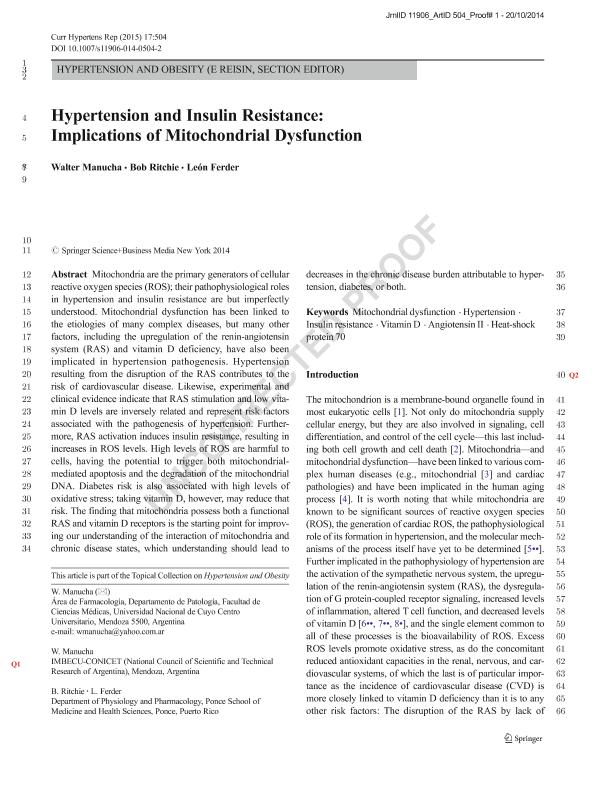Mostrar el registro sencillo del ítem
dc.contributor.author
Manucha, Walter Ariel Fernando

dc.contributor.author
Ritchie, Bob
dc.contributor.author
Ferder, León
dc.date.available
2019-07-26T17:54:03Z
dc.date.issued
2014-11
dc.identifier.citation
Manucha, Walter Ariel Fernando; Ritchie, Bob; Ferder, León; Hypertension and Insulin Resistance: Implications of Mitochondrial Dysfunction; Springer; Current Hypertension Reports; 17; 1; 11-2014; 1-7
dc.identifier.issn
1522-6417
dc.identifier.uri
http://hdl.handle.net/11336/80396
dc.description.abstract
Mitochondria are the primary generators of cellular reactive oxygen species (ROS); their pathophysiological roles in hypertension and insulin resistance are but imperfectly understood. Mitochondrial dysfunction has been linked to the etiologies of many complex diseases, but many other factors, including the upregulation of the renin-angiotensin system (RAS) and vitamin D deficiency, have also been implicated in hypertension pathogenesis. Hypertension resulting from the disruption of the RAS contributes to the risk of cardiovascular disease. Likewise, experimental and clinical evidence indicate that RAS stimulation and low vitamin D levels are inversely related and represent risk factors associated with the pathogenesis of hypertension. Furthermore, RAS activation induces insulin resistance, resulting in increases in ROS levels. High levels of ROS are harmful to cells, having the potential to trigger both mitochondrial-mediated apoptosis and the degradation of the mitochondrial DNA. Diabetes risk is also associated with high levels of oxidative stress; taking vitamin D, however, may reduce that risk. The finding that mitochondria possess both a functional RAS and vitamin D receptors is the starting point for improving our understanding of the interaction of mitochondria and chronic disease states, which understanding should lead to decreases in the chronic disease burden attributable to hypertension, diabetes, or both.
dc.format
application/pdf
dc.language.iso
eng
dc.publisher
Springer

dc.rights
info:eu-repo/semantics/openAccess
dc.rights.uri
https://creativecommons.org/licenses/by-nc-sa/2.5/ar/
dc.subject
Angiotensin Ii
dc.subject
Heat-Shock Protein 70
dc.subject
Hypertension
dc.subject
Insulin Resistance
dc.subject
Mitochondrial Dysfunction
dc.subject
Vitamin D
dc.subject.classification
Salud Ocupacional

dc.subject.classification
Ciencias de la Salud

dc.subject.classification
CIENCIAS MÉDICAS Y DE LA SALUD

dc.title
Hypertension and Insulin Resistance: Implications of Mitochondrial Dysfunction
dc.type
info:eu-repo/semantics/article
dc.type
info:ar-repo/semantics/artículo
dc.type
info:eu-repo/semantics/publishedVersion
dc.date.updated
2019-06-11T15:19:24Z
dc.journal.volume
17
dc.journal.number
1
dc.journal.pagination
1-7
dc.journal.pais
Estados Unidos

dc.journal.ciudad
Philadelphia
dc.description.fil
Fil: Manucha, Walter Ariel Fernando. Consejo Nacional de Investigaciones Científicas y Técnicas. Centro Científico Tecnológico Conicet - Mendoza. Instituto de Medicina y Biología Experimental de Cuyo; Argentina. Universidad Nacional de Cuyo. Facultad de Ciencias Médicas; Argentina
dc.description.fil
Fil: Ritchie, Bob. Ponce School Of Medicine; Puerto Rico
dc.description.fil
Fil: Ferder, León. Ponce School Of Medicine; Puerto Rico
dc.journal.title
Current Hypertension Reports

dc.relation.alternativeid
info:eu-repo/semantics/altIdentifier/url/http://link.springer.com/article/10.1007%2Fs11906-014-0504-2
dc.relation.alternativeid
info:eu-repo/semantics/altIdentifier/doi/http://dx.doi.org/10.1007/s11906-014-0504-2
Archivos asociados
